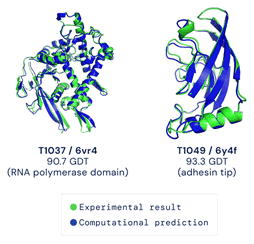DeepMind is no stranger to showcasing impressive wins in AI, developing systems that have successfully taken on humans at Chess, Go, and even StarCraft. Co-founder and CEO Demis Hassabis has always stressed however that these wins are not the end goal: DeepMind’s ultimate aim is “solving intelligence, and then using that to solve everything else”[1].
In late November 2020, DeepMind announced that it has solved one of biology’s grand challenges: how proteins fold from a linear chain of amino acids into a 3D structure that enables their complex functions.
DeepMind’s AlphaFold2 approach combines deep learning with an “attention-based neural network system” that treats a protein as a spatial network graph, with each amino acid as a node and the edges representing their proximities in the folded protein[2]. AlphaFold2 comfortably took the top spot at 2020’s 14th Critical Assessment of Protein Structure Prediction competition.

Overlays of protein structures in green with AlphaFold2’s predictions in blue.
Image: DeepMind
Computationally achieving near-experimental accuracy is particularly exciting; the imaginable applications within research are endless. IP repercussions will inevitably follow.
The UK IPO is currently analysing feedback from a recent call for views on the impact AI might have on IP. In the UK, mathematical algorithms, which lie at the heart of AI systems, are not patentable. But inventions involving mathematical methods, along with computer programs, are, if shown to make a technical contribution. The last independent review of the UK patent system in 2011—arguably when many practical aspects of AI were in their infancy—recommended keeping the line drawn between those computer programs that are excluded from patent protection and those that are not[3]. The recent call for views looks to consider whether this conclusion is still appropriate today for AI technologies.
EPO practice seems settled but, similarly to the UK, AI cannot be patented unless it relates to a “technical” implementation or application, meaning that many AI inventions are excluded from protection.
DeepMind themselves may have their own thoughts on the UK IPO and EPO stance on AI: a family of DeepMind’s international applications was published in March 2020[4]. The three applications claim the same priority dates and claim 1 in each case defines methods for exploring protein structures.
Incidentally, DeepMind also have more than 20 further published AI patent families that mention “protein” somewhere in the description[5]. Google (who acquired DeepMind in 2014) also appear to have some IP interest in the field, with at least 2 published patent families with the phrase “protein folding” in the claims[6].
AI-enabled accurate structure prediction will help drug designers quickly establish the structures of proteins in dangerous pathogens like SARS-CoV-2 – key in the drive to find ways to block them.
The crucial question with respect to AlphaFold2 amongst the biological research community is how quickly the system will be made more widely available. We look forward to the answer to this question and to any shift in how the EPO and UK IPO view AI patent applications.
A PDF of our extended article can be accessed here.
[1] “How Google plans to solve artificial intelligence”, MIT Technology Review
[2] “AlphaFold: a solution to a 50-year-old grand challenge in biology”, DeepMind
[3] Digital opportunity: a review of intellectual property and growth, s6.25, UK Gov
This is for general information only and does not constitute legal advice. Should you require advice on this or any other topic then please contact Frances Wilding or your usual Haseltine Lake Kempner advisor.